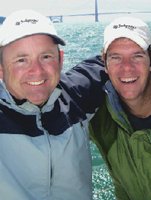Taking Eco From Outdoor to Premium
A trip to South America more than 15 years ago turned Scott Leonard’s vacation into a vocation.
Leonard is chief executive officer and co-founder of Santa Rosa, Calif.–based Indigenous Designs, a company that has taken its mission of eco-friendly, fair-trade design from its outdoor roots into the contemporary market.
Founded in 1995 by Leonard and Matt Reynolds, Indigenous today employs more than 1,000 artisans throughout South America at more than 300 knitting groups in Peru and Ecuador.
“We’re so focused right now on messaging the quality over quantity,” Reynolds said. “For us, we take the slow approach to making our clothes. Focusing on attention to the details, respecting cultural traditions, making it by hand, making it so it’s a garment that will last lifetimes.”
Because of their vertical operation, Indigenous keeps its prices competitive. Retail prices range from $89 to $320 for some of the hand-knit pieces and $26 to $68 for the accessories. The company’s fair-trade jersey pieces, which are manufactured by a small, family-run operation that uses fair-trade practices, are priced between $64 and $100.
Indigenous sells its collection to more than 600 outdoor and specialty retailers, including Garnet Hill, Territory Ahead, Yoga Works and Louie Permelia.
The company got its start in the outdoor business by selling chunky, hand-knit sweaters for men. Reynolds said he and Leonard had their eye on the premium market, but it took several years to perfect the textile and design development.
“We had this vision to be a premium line for many, many years, but we did not have the ability to meet that level,” he said. “As we grew and progressed as a company we got better and better and better at processing the organic yarns, spinning them, building the relationships with best-in-class boutique mills, training the artisans, elevating design—all the things that were necessary—including bringing in the financing and certification for fair trade and organic.”
The shift opened up new markets for Indigenous—contemporary boutiques that have no tie to the outdoor market. “Our fastest-growing niche is in the premium-boutique channel,” Reynolds said.
But as the company evolved, so did the outdoor industry, Reynolds explained, and outdoor retailers began buying more upscale, contemporary styles and collections.
“Just because you’re an outdoor enthusiast doesn’t mean that down from the mountain you don’t want to be styling and looking sexy and beautiful. So we merged the worlds by providing very beautiful, luxury, high-end fashion to that outdoor person and connecting the synergy between their beliefs about nature and living in the outdoors to the fashion.”
Louie Permelia, the Pacific Northwest retailer with four locations in Washington, Idaho and Oregon, has carried Indigenous for a little more than a year, according to Antoinette Forseth, who co-owns the chain with Lisa Humphrey and Virginia Trout. The collection appeals to shoppers looking for classic pieces with a timeless quality.
quot;[Indigenous] has retailed well to a wide range of customers,” Forseth said. “It is a great quality line that has a little fashion, but is not trendy. Our customers are women who purchase a sweater to have in their closet for a long time. It is not the customer who buys the “here and nowquot; styles. She is a women who wants quality and wearablity.”
Green from the start
Indigenous’ focus on sustainability begins with the raw materials and extends throughout the entire corporate culture.
Indigenous’ fashions are made from organic and eco-friendly materials—including organic cotton, free-range Alpaca, living silk, merino wool and Tencel—and are dyed using low-impact, Oeko Tex 100–approved dyes.
“From Day One, over 15 years ago, our vision was to honor both people and the planet,” Leonard said. “I set out on my first trip to the high Andes with these ideals in mind. Our path was chosen. Matt and I are very proud that these same values remain firmly in the DNA of the Indigenous brand today.”
Although the company has had an eco ethos since the beginning, Reynolds said he’s begun to see green as the norm, rather than the exception.
“I believe we’re going into a time where it’s not if you’re green, it’s if you’re not that’s more noticeable,” he said. “Organic is the future. Organic is on a roll; the snowball is going down the mountain on its own.”

























